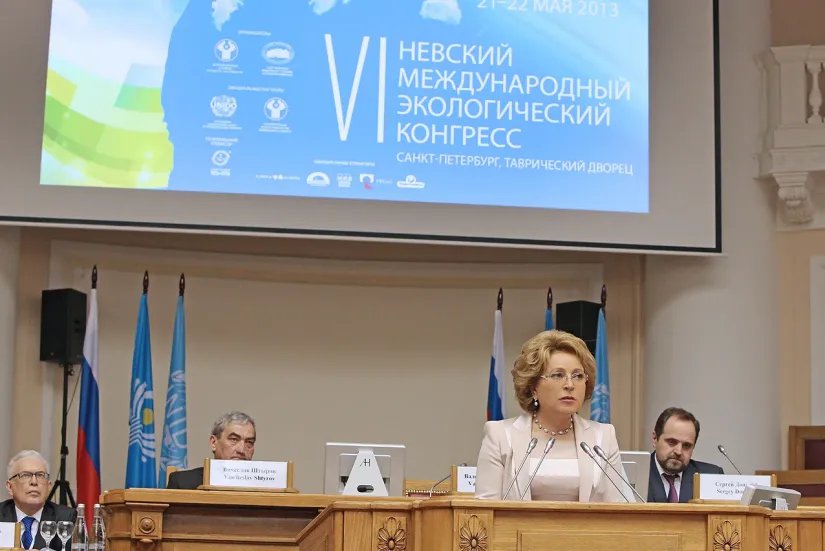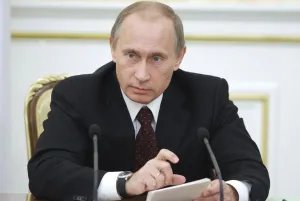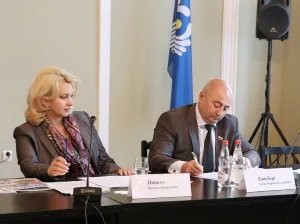Statement of Federation Council Speaker Valentina Matvienko at the VI Nevsky Eco-congress
21 May 2013

May I warmly welcome you all for attending the VI Nevsky Eco-congress. May I also extend my gratitude to the IPA CIS and the Government of St Petersburg for their warm hospitality.
The Congress has a history of five years. Over this period of time it won a prominent position in the international conservancy. This time again, our general partner is the United Nations Industrial development Organization. Again we have a roll call of public and civil and business leaders, researchers and advocates from around the world.
This year 2013 is the Year of Environmental Awareness and Conservation in the CIS and Russia. In this context, the Congress this year acquires special attention.
Environmental Awareness as a Tool for Environmental Solutions Is the overarching subject-matter of the Congress this year.
Our strategic objective is difficult to achieve, namely to devise initiatives and mechanisms that would lead to better environmental awareness and changes in personal life-styles and patterns of behaviour.
History has a long litany of destroyed ecosystems and vanished species as a result of immediate utility, misunderstood interests and sheer greed. All of these outcomes were realized as irresponsible and reckless actions of individuals rooted in environmental obscurantism.
Yet, both history and modernity offer a host of relationships between man and nature based on harmony and wisdom.
Environmental awareness is an outcome of both positive end negative experiences. But above all it should be preventive.
We must preserve not only traditional environmental practices, but also to promote urban and industrial environmental visions, having in mind the so-called green growth and individual environmental awareness.
There is a growing number of businesses and industries and even states that have embraced the environmental paradigm. There is a growing number of national and international action plans aiming at conservation, energy efficiency, harvesting alternative sources, creation of better living conditions. Green economy is attracting more resources and media space.
By definition, nature knows no artificial borders. It acts in its own ways and has in store asymmetric responses to out recklessness and ignorance. It follows that our future is contingent on the effective coordination and cooperation on the entire range of environmental issues and practical policies.
Here it would be appropriate for me to note that comprehensive social, economic and ecological outcomes is at the center stage of our national government. To quote President Putin, the nation must be responsible for the natural environment it lives in. Like charity, conservation begins at home, at every household, street, township and community.
Hopefully, our five years of history have made a contribution toward this goal.
I also believe that the CIS will come to living not only in a common economic and humanitarian space, but in a common ecological space as well, thereby setting out a single green imperative to the economy.
Work is already under way to draft a body of model ecological law, including in the IPA CIS.
It is common knowledge that achieving EA will require an adequate and comprehensive legal framework. This framework must be balanced and coherent.
To give you an idea what I mean by coherent: sanctions for violations must contain a correctional element, an obligation to improve ecological behaviour. Implementation of the principle “polluter pays” must be coupled with revamping dirty technologies and deployment of environmentally safer ones.
Official figures put the cost of environmental damage at 6% of GDP. This is dry statistics, rather than reality. Reality has elements that do not lend themselves to monetary metrics. There are other areas of concern. In Russia, some 55 m people live in heavily polluted ambient air, which affects their state of health and longevity. Overall, 60% of total population is estimated to live in unhealthy environment.
Instead of band-aid solutions, comprehensive environmental governance and audit are needed. This is what some countries are already doing.
Recently, Russia has drafted and enacted a package of ecological legislation.
Nationwide programs are being implemented in forestry, biotechnologies, energy efficiency, eco-rehabilitation. There is even a special federal program to protect out national treasure – the Lake Baikal and outlying natural landscapes.
Here it would be appropriate to mention one fundamental document which is the National Ecological Strategy till the year 2030.
As we speak, the State Douma is reading a series of draft regulations for the disposal and treatment of waste, deployment of modern technologies. I am sure, these document will be prominent at the Congress as discussed by officials, legislators, businesses and civil society.
Travelling extensively across the nation, I have a strong impression that things are starting to move from ground zero. I hope this is the vindication of what Otto Bismarck said about Russians: they are slow starters but fast movers. Whatever, nine federal regions have legal frameworks promulgating ecological awareness. New natural reserves and national parks appear on the map, efforts are made to protect endangered species. Should this trend continue, the protected area will exceed the entire territory of Spain.
Ensuring the security of major oil and gas projects, mining and energy sector is at the top of our priority list. We are cleaning up our act in the Arctic, a territory especially vulnerable to pollution. 35 thousand wildcat garbage dumps have been eliminated.
There is a growing number of major corporations that are deploying clean and lean technologies. For us it is crucial to embed green philosophy into our modernization drive to arrive at an original model of green outcomes “made in Russia”, into bio-tech and long-term urban planning.
The second plenary will discuss the prospects of bio-economy and bio-tech. Biology as a science and attending field of its applications will be the way of the future which will bring us in harmony with nature. For all the good that it brings, we will need strict monitoring of bio-applications, their effect on human health and the environment.
Dear colleagues! We know only too well that all legal and practical efforts are bound to fail unless we mobilize the civil society. Countering legal dismissiveness is a hopeless proposition absent sound moral foundation. In every sense it is true to say that today we are facing an immediate task of fighting ecological illiteracy. We need a strong system of environmental education, instruction and outreach. Work must start at an early age when a young and innocent mind is open to the messages of nature so much as to the words of a caring mother. Eco-education must extend to the family, the school and pre-school, professional training and humanitarian tuning. The point is to make eco-awareness an engaging and informative process, rather than a matter of routine and formality.
Literature and arts have a role to play in broadcasting the eco-message. Today, quality nature writing is lacking. To be sure, there is plenty of TV features about wildlife, all those exotic places. There are good periodicals. All of this is just fine. However, - and I hope you will agree with what I am going to say, - we need artistic community to speak out for the environment in a voice more loud, convincing and authoritative. Until very recently, we had a roll-call of outstanding authors writing about nature: Prishvin, Paustovskiy, Bianki and so many others. Their writings made their contribution toward cultivating love for nature.
For too long we’ve been fed by a paradigm that nature is workshop and man is a worker. If so, than tidiness and caution at the workplace are in order. Yet, in our own history there are so many contrasting examples of destructive behaviour of turning temples into stables.
Reality compels us the change the ways we see the world around us. It is the cultural dimension that prevents us from deletery actions on the environment.
There is no doubt in my mind that your Congress will generate fresh ideas, while aiming to address practical solutions.
May I wish you every success.
Thank you for your attention.



